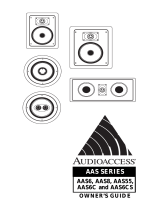JBL
®
TS SERIES
For more than 60 years, JBL
®
audio equipment has been chosen for top concert
halls, recording studios and movie theaters around the world, becoming the
hands-down choice of leading recording artists and sound engineers. With the
JBL TS Series, innovative technologies such as pure-titanium compression
drivers, Elliptical Oblate Spheroidal
™
(EOS) waveguides and magnesium-alloy
transducer reinforcement are available to you. Enjoy!
UNPACKING THE SPEAKERS
If you suspect damage from transit, report it immediately to your dealer. Keep
the shipping carton and packing materials for future use.
INCLUDED WITH THE TS6000 AND TS8000
PLACEMENT
NEVER drag the speaker to move it, as this will damage the spikes, the
feet and/or the wood cabinet itself. Always lift the speaker and carry it to its
new location.
CAUTION: Floorstanding (tower) loudspeakers have a high center
of gravity and may become unstable and tip over during events such as
earthquakes, or if rocked, tipped or improperly positioned. If this is a concern,
these speakers should be anchored to the wall behind them, using the same
procedures and hardware customary for anchoring bookcases and wall
units. The customer is responsible for proper installation and proper selection
of hardware.
STEREO
Before deciding where to place your speakers, survey your room and think
about placement, keeping the following points in mind, using Figure 1 as
a guide:
• For best results, place the speakers 6'–8' (1.5m–2.5m) apart.
• Position each speaker so that the tweeter is approximately at ear level.
• Generally, bass output will increase as the speaker is moved closer to a
wall or corner.
• Refer to the “Home Theater” section below if you also plan to use the
speakers for home theater reproduction.
Figure 1. Experiment with speaker placement to obtain
the best bass level and stereo imaging in your room.
HOME THEATER
For front-channel use, place one speaker on the left and another on the right,
along either side of the television monitor. Since the speakers are magnetically
shielded, you can place them near the TV without worrying about the field
distorting the TV picture.
Forsurround-channel use, place speakers on bookshelves or stands alongside
the listening position. Final placement depends on room acoustics, availability
of space and your listening preference (Figures 2 and 3).
In 6- or 7-channel configurations, place the rear channel(s) behind the listening
position, as shown in Figures 2 and 3.
NOTE: A JBL powered subwoofer will add impact and realism to both
music and film soundtracks. Contact your JBL dealer for recommendations
on subwoofer models for your application.
Figure 2. This overhead view shows a typical home theater plan. Left/right
rear channels are for a 7-channel system. The center rear channel is for
a 6-channel system.
Figure 3. This figure shows an alternate layout, which may be more suitable
for some rooms. Left/right rear channels are for a 7-channel system. The
center rear channel is for a 6-channel system.
INSTALLING SPIKED FEET
TS6000, TS8000
Five metal spikes are supplied for use when the speaker is to be placed on a
carpeted surface; using them decouples the speaker from the floor to prevent
unwanted damping. To insert the spikes, gently lay the speaker on its side (not
its front or back) on a soft, nonabrasive surface, and unscrew the rubber-tipped
feet (store in a safe place). Each spike then screws into the threaded insert in
each corner. Make sure all five spikes are screwed in completely for stability.
To protect the surface of uncarpeted floors, set each spike into an included
metal coaster.
NEVER drag the speaker to move it, as this will damage the spikes, the
feet, the wood cabinet itself and/or the floor. Always lift the speaker and carry it to
its new location.




 1
1
 2
2
 3
3
 4
4
Harman GT-X424 User manual
 Audioaccess AAS6CS Owner's manual
Audioaccess AAS6CS Owner's manual
Lee Technology Korea QBTLTK-P1 User manual
Crestron FT-TS600 User guide
Infinity CS 60R Owner's manual
Monitor Audio CP-CT260 Installation guide
Infinity Beta C360 Owner's manual
Infinity BETA10BE User manual
Crestron FT-TS600 User guide
Infinity Infinity Beta 10 Owner's manual




